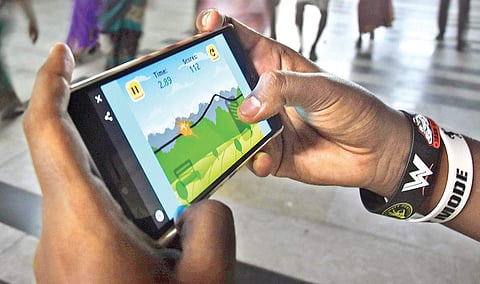

CHENNAI: Would you feel uncomfortable without constant access to information through your smartphone? Would you be annoyed if you could not look information up on your smartphone when you wanted to? Would running out of battery on your smartphone scare you? Would you feel weird because you did not know what to do without your smartphone?
These are four of the 20 questions from the Nomophobia Questionnaire designed by Caglar Yildirim and Ana-Paula Correia. Nomophobia or “NO MObile PHOne phoBIA” is the fear of not being able to use your cellphone or other smart devices. “Digital addiction is not just a trending term, it is an actual addiction that most people do not even realise they’re suffering from,” said Bindiya Murgai, therapist and mental fitness coach, who runs Healing Hideaway in the Nilgiris. “When technology is taken away from them, they feel lost, and suffer from real withdrawal symptoms like panic, anxiety, depression, restlessness, and even rage. These are symptoms similar to what alcohol and drug addicts experience. While it’s unrealistic to live without technology in these times, the key lies in striking a balance, in creating well-defined digital boundaries, and tech hygiene. It is vital to control your use of technology, instead of letting technology control you.”
Bindiya’s programme is for those above 15 years of age, but she is aware that a lot of younger children are addicted, too. “Digital addiction sets in very early these days. Parents let their children as young as one and two have access to mobile phones and other gadgets,” says Murgai.“Devices then become a way of life for them, deeply embedded in their very grain and psyche, becoming inseparable and indispensable to their being. To wean them off later becomes a lot harder in such scenarios.”
While digital addiction is seen across the board, among those who are young and old, the non-stop buzzing of the mobile phone is wrecking many relationships. “There are many couples who come for counselling, and more often than not, I find that the mobile phone is creating a huge communication void,” she says. “It results in infidelity, often leading to valid, and sometimes completely imaginary suspicion. People also often complain that their partners are in a perpetual relationship with their phone, rather than being in the moment and spending quality time with them. This creates a lot of disgruntlement, unhappiness, and trust issues among couples.”
While the overuse of technology can impact one’s health and relationships, it also impacts productivity, experts said.“We don’t realise that we are getting addicted and how many hours we are spending on our devices, till we are forced to unplug and disconnect,” said Chandni Aggarwal, CEO and Founder of Transforming Travels, which organised a ‘Digital Detox’ trip in April. “It took me a long time to consciously control my urge not to check my phone every time it beeped, but rather to check it at my own convenience. I used to keep it under my pillow and sleep earlier, now I switch off my data pack every night and sleep. If I am eating, I do not check my phone no matter how many times it rings.”
Digital detox programmes and trips are generally organised in remote areas, where there is no access to network. Experts believe it is the most effective way to completely disconnect from the virtual world and be one with nature.“When we organise a digital detox programme, the most important factor that we take into consideration is to ensure that the place we pick is one that is close to nature,” Aggarwal said. “A place that is remote and does not have too many tourists around who will be using their phones because that defeats the purpose. We make everyone engage in activities like organic farming, nature walks, treks and make them interact with locals, explore the culture of the place and just relax.”
For 42-year-old K Srikanth, who was one of the travellers on the trip from Chennai, the experience changed him ‘profoundly.’ “Initially, I got a little irritated that I could not use my phone because we are so accustomed to informing our family of our whereabouts,” he said. “But later on, I did not feel the need to check my phone at all. On trips like this, I usually first click photographs and upload them but none of us felt the need to do that.”
After coming back, Srikanth* said he made it a point to inculcate a few habits in his daily life in order to decrease his dependence on the mobile phone. “I have made small changes that are making a difference in my life,” he said. “I check my phone only once I reach office now which gives me a good two or three hours in the morning where I just focus on myself. Even at night, I put my phone on silent and disable the network. I find that my sleeping has improved. Earlier where I would sleep for six hours, now I get at least eight hours of sleep. I wake up feeling fresh, enthusiastic and rejuvenated in the mornings.”